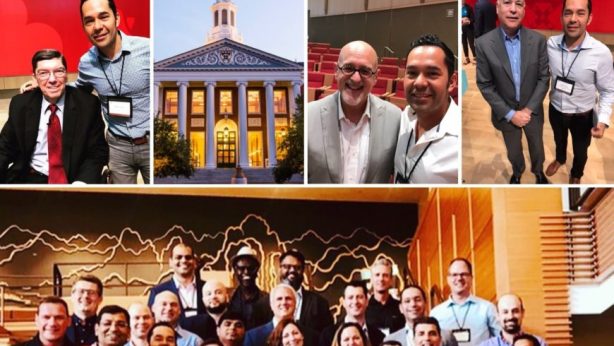Thrive in Today’s VUCA World by Embracing Paradoxes
Today’s world is more volatile, more uncertain, more complex, and more ambiguous than ever. In today’s lingo, we live in “VUCA” times. Take a minute to reflect on some of the following realities: Exponential organizations that did not even exist a few years ago, today dominate the economy. Ninety percent of all the data ever created was created in the last two years. Corporations’ life spans are a fraction of what they were just a couple of generations ago. And of course who is not pondering about whether machines and algorithms are going to take over our jobs. My life has been full of VUCA, and as such, the path I have chosen is actually an ambiguous and paradoxical one. What brings meaning to my life is to receive in order to give, and paradoxically the more I give the more I receive. This has taught me that in order to thrive in a VUCA world, you need to lose the fear of paradoxes.
Paradox Defined
A paradox is a statement that is seemingly contradictory or opposed to common sense and yet it could be true. There has been plenty written about creativity arising when we make connections among different or unrelated items. Others have said that intelligence is actually a paradox, that it involves the ability to use opposing ideas at the same time. The use of paradox has been widely used in the works of Plato, Heraclitus, Friedrich Nietzsche, and Friedrich Hegel, just to name a few. To quote one of America’s best known polymaths, F. Scott Fitzgerald,
The test of real intelligence is the ability to hold two opposed ideas in mind at the same time, and retain the ability to function.
I do not believe dealing with paradoxes comes naturally to most, but very creative people and geniuses become that because they embrace paradoxes. Mihaly Csikszentmihalyi has researched this topic at length, and has concluded that creativity is an essential element of meaning. Furthermore, he concluded that what creative people have in common are contradictions and paradoxes. So, how important are paradoxes besides simply making you a genius? I would like to point out two cases to illustrate their immense influence over us.
Western Science Meets Eastern Mysticism
The rationality of modern Western science has a lot more in common with the spiritual beliefs of Eastern religions than what meets the eye. It has taken us a while as humanity to reconcile these two philosophies. They appear to be opposite to each other and have nothing in common, but there are major themes that could bind them together. They both believe in the unity of all things and events. Modern science or physics has posited that all particles are interconnected,and that space and time cannot be separated. Similarly, Eastern religions have been teaching transcendentalism or oneness with the universe for thousands of years, and that there is no space without time and vice versa. Both modern science and Eastern religions believe in an inherent flow of the whole universe. The Eastern religions are based on the cyclical principle of nature, of a continuous flow and change. Science has agreed with the continuous flow paradigm ever since Hobble discovered in 1929 that the universe is expanding. The first person to make the paradoxical connection between science and religion was Fritjof Capra in his ground-breaking book “The Tao of Physics”, which I heavily recommend. Imagine all we could do if science and religion could embrace these paradoxes. I imagine we could at the very least end many of the senseless differences we have today.
The Paradox of Our Time
The “Paradox of Our Time” attributed to George Carlin, but most likely written by Bob Moorehead, has been circling around for many years, and encapsulates how many feel about the world today. If you have not read it, or if it has been a while since you read it, I encourage you to revisit it here, and reflect on it. I will quote some of the passages that inspire me the most to act:
We have bigger houses and smaller families; More conveniences, but less time. We have more degrees, but less sense; More knowledge, but less judgment; More experts, but more problems; More medicine, but less wellness. We have multiplied our possessions, but reduced our values. We’ve learned how to make a living, but not a life; We’ve added years to life, not life to years. We’ve been all the way to the moon and back, but have trouble crossing the street to meet the new neighbor. We’ve conquered outer space, but not inner space.
Although I agree with this paradox, I also believe there is another opposing and equally important reality that the media does not talk much about, but we must embrace. I consider myself to be a Rational Optimist, and truly believe that we live in the best time ever for humanity. Think about the following contrasts between today and last century and on a way smaller population base: The number of deaths in World War II are estimated to be 80 million or more, while it is estimated that the current bloodiest armed conflict in Syria has claimed the lives of about half a million people. The 1918 Spanish Flu pandemic killed anywhere between 50 to 100 million, while Ebola (the most widespread and fear-inducing epidemic we have had this century) had 11,000 fatalities. As humanity, we were able to accomplish nearly all of the United Nations millennium development goals, which means that once seemingly impossible goals were achieved in only 15 years in the vital areas of poverty, education, gender equality, child mortality, maternal health, disease, and the environment. Of course a lot of work remains to be done, especially in the area of the environment, but despite things being bad, paradoxically they are also relatively very good. So, what can we do to get our heads around all this contradicting information?
Synergistic Paradox
If you thought the above sounded nuts, wait until you read the following. Thank you for getting inside this rabbit hole with me. I believe true genius is the ability to mix not only different, but actually opposite items, and then come up with something even better than the two original items. That is what I call a “Synergistic Paradox”. The definition of synergy is a whole that is greater than the sum of the parts. Synergy typically arises when complementary parts come together. However, I postulate that you can create even more synergy when you mix opposite parts, rather than simply complementary ones.
Let’s test that by getting back to meaning and happiness with another paradox. The paradox of hedonism states that when you pursue happiness or pleasure for its own sake, you will not find it. Only when you pursue something else, you achieve true happiness. Consciously pursuing happiness actually interferes with experiencing it. How is that for a paradox? I propose that the solution to this paradox is yet another paradox! When you give joy to someone else, the one that actually receives the most joy and ultimately fulfillment is you. That is my definition of “meaning”, to receive with the intent of giving. There has been plenty of scientific research on this topic, and most points out to the fact that people who have meaning are more content in the long-term than those who simply pursue happiness. Even poor nations that have high levels of meaning typically have lower suicide rates than developed nations with lower meaning levels. Amazingly enough, not even lottery winners are guaranteed happiness, according to research. The solution to a paradox of not finding happiness by searching for it, is another paradox… you will find happiness by giving happiness to others.
Summing It Up
I hope this reflection prompts you to have different mindsets and paradigms about paradoxes. Ultimately, I hope this helps you deal with the many paradoxes you will find in the years to come in this VUCA world. You do not need to be fearful of them, but instead reformulate them, combine them, experiment with them, and use them to your advantage. I believe someday humanity will embrace the magic of the paradox of the similarities of religion and science. I also believe humanity will eventually be able to cope and thrive in The Paradox of Our Times and appreciate the beautiful world we live in. It all starts with embracing synergistic paradoxes. You can begin by living a meaningful life, which in the short-term is the toughest choice, but in the long-term it will paradoxically bring you ever-lasting fulfillment. If you are ever stuck at a crucial decision in your life, think outside of the box in synergistic paradoxical terms. I leave you with one last quote from one of the most popular geniuses ever, Albert Einstein:
No problem can be solved from the same level of consciousness that created it.
1,408 total views, 3 views today



Love reading your blog! I always learn something new. I like the historical facts you provide like the 1918 Spanish flu pandemic. I actually googled it to learn more about it. And I agree that when you give happiness to others the one that ends up even happier is you! When I have volunteered in the past all the people that I was able to help thanked me but I was the one blessed by being able to help them! It was a very rewarding experience!
Thanks for the well written blog!